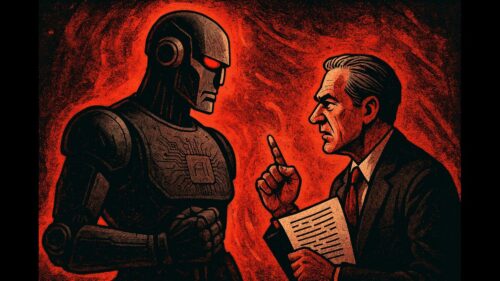
The Decentralized Future of Private AI [Illia Polosukhin] – 749
October 1, 2025
Yeah, you know what that means… Sora 2. Is. Out. #sora #sora2
October 2, 2025
You would have to be a blind man if you cannot see that the tech giants have this world on a razor’s edge of disquiet. Even if you can’t see because your eyes do not work, you can feel this foreboding in the air, vibrating like a pulse. The men and women who make up the upper echelon of companies pushing Artificial Intelligence forward with reckless abandon do not give a hoot about the world’s collective apprehension. Let’s talk about the human risks.
When people raise concerns about artificial intelligence, the most common response from its advocates is a reassuring shrug: “We’ve seen this before.” They point to the Industrial Revolution, to the steam engine, the assembly line, or the spread of computers. Yes, workers were displaced, the story goes, but new industries and new jobs eventually emerged. Technology may shake things up, but in the end, it balances itself out. This is the mantra repeated by those driving today’s AI revolution, and it is total bullshit.
Their analogy is misleading, and dangerously so. AI is not simply another tool, not just a more efficient machine. It is categorically different from past breakthroughs in ways that make historical comparisons inadequate. History teaches us that those who shape new technologies are not always motivated by the public good. The same corporations and leaders who reassure us today are driven by market dominance, shareholder value, and national competition. To assume their interests align perfectly with the broader interests of humanity is naïve at best.
We must therefore resist the soothing narratives that tell us this is “just like the last time.” It isn’t. For the first time, humanity is building a tool that encroaches not on our muscles, but on our minds. The direction AI takes, and the power structures it reinforces, will define not just the future of work, but the future of human identity and freedom. That makes questioning its trajectory and the intentions of those pushing it forward not only smart but obligatory.
AI is not a cyclical labor market adjustment but a fundamental rupture. The human risks are incalculable. By automating cognitive processes and centralizing unprecedented economic and informational power, it demands a level of caution and critical engagement that surpasses historical precedent. Questioning the rapid, often unilateral direction taken by the small group of developers and executives pushing AI forward is not a reactionary impulse, but a responsible imperative to ensure that human values, judgment, and agency remain central to the future of this planet. Must make no mistakes, they are fucking with the whole world here.
Moreover, AI’s scale and speed are unprecedented. It can be deployed globally in seconds. It can manipulate public opinion, rewrite history, and reshape culture, all invisibly, algorithmically. The risks are not hypothetical. They are already manifesting in surveillance systems, biased decision-making, and the erosion of trust in information itself.
The impulse to accelerate AI development, regardless of the societal cost, often stems from a dangerous mix of ideological belief in technological inevitability and pure economic ambition. For many of the key figures leading this charge, the risks of mass unemployment, information warfare, or algorithmic bias are simply externalities or unfortunate side effects to be managed, but not reasons to slow down. Their single-minded pursuit of breakthroughs, often framed as a “race to the top,” reveals a willingness to prioritize profit and prestige over proactive safety, suggesting a profound indifference to the actual damage their creations might inflict on the global workforce and democratic institutions.
The uncomfortable truth about the human risks is that many of the individuals and corporations driving AI forward simply do not care about the risks or the damage they create. Their focus is on speed, dominance, and profit, not on the long-term consequences for society. They are building systems whose impacts they cannot fully predict, while downplaying concerns as “overblown” or dismissing critics as “anti-progress.” This indifference to risk is not accidental; it is a feature of the race they are running. I’m going to say this as clearly as I can: these people are doing an unsupervised experiment on the entire human race without our consent. They have no idea, any more than you do, where this is all heading, and they do not care.
Book
Quantum Morality: Entangled Morals In The Quantum Age
Copyright © 2025 “This blog emerged through a dialogue between human reflection and multiple AI systems, each contributing fragments of language and perspective that were woven into the whole.”


